Content from the Brookings Doha Center is now archived. In September 2021, after 14 years of impactful partnership, Brookings and the Brookings Doha Center announced that they were ending their affiliation. The Brookings Doha Center is now the Middle East Council on Global Affairs, a separate public policy institution based in Qatar.
Moroccan foreign policy has garnered significant attention in recent months amidst heightened tensions with the European Union, talks of further rapprochement with Israel, and stronger stances vis-à-vis its involvement in the Libyan peace process and its claim over the disputed territory of Western Sahara. Some argue that U.S. recognition of Morocco’s sovereignty over the latter has emboldened its decisionmakers, while others describe Rabat’s recent redirections as “aggressive.” What, in fact, is happening with the kingdom’s foreign policy?
As Morocco’s relationships with its traditional partners in Europe and with the Gulf monarchies became occasionally strained over the last decade, its decisionmakers sought to strengthen the kingdom’s position regionally and internationally through three strategies aiming to promote its diplomatic, political, security, and economic interests: diversifying international partnerships to avoid over-relying on traditional partners and acquiescing to their demands; attracting investment from Asia and Europe by turning the kingdom into an African financial and trade hub; and positioning the country as a regional security partner, stability provider, and mediator by taking an involved role in the Libya peace process and by partially normalizing ties with Israel. What are the implications of this approach?
Turbulent ties
The 2000s marked the strengthening of relations between the kingdom and its counterparts in the Gulf, which have long been traditional partners for Rabat, and which provide it with financial support and backing in regional forums in exchange for security cooperation. However, between 2017 and 2021, Morocco’s close ties to Qatar and neutral stance during the Saudi and Emirati-led blockade against the latter triggered tensions with Riyadh and Abu Dhabi. Although Morocco officially refused to take sides, it arguably favored Qatar, sending supplies amidst fears of food shortage and maintaining security and trade relations despite pressures from the blockading countries, which adopted hostile rhetoric about Morocco, cancelled planned trips, and recalled ambassadors.
The kingdom has also clashed with Europe — its largest trade partner, investor, and donor —repeatedly over the last decade, including with Spain and Germany over Western Sahara this year. Despite deep economic ties and a particularly close relationship with France, Moroccan decisionmakers have sought to reduce EU influence on the kingdom by leveraging the country’s role in controlling irregular migration to Europe and helping European states like France and Spain foil terror attacks on their soil.
Normalization with Israel: Two birds, one stone
Beyond its symbolic significance, the Moroccan state’s historic deal with Israel and the United States has significant security, financial, and diplomatic implications. In exchange for partial — not full — normalization, the United States recognized Morocco’s sovereignty over Western Sahara, pledged $3 billion in investment to its private sector, and agreed to a $1 billion arms sale (pending approval by Congress). Partial normalization could also ensure major benefits from Israel in terms of trade, investment, and cooperation in key sectors such as tourism and technology.
Despite some domestic discontent and regional criticism, there will likely be further rapprochement between Morocco and Israel. Indeed, the Moroccan foreign minister expressed the kingdom’s intention to take the relationship as far as possible; and Israel’s foreign minister recently announced that he would visit Rabat in mid-August. The two states signed a cyberdefense accord in July 2021, and are likely to increase security and economic cooperation down the line. As long as the Biden administration does not reverse its predecessor’s recognition, Rabat so far has no reason to pull out of the deal. However, it remains unlikely that Morocco would go so far as to open an embassy in Israel due to domestic and regional opinion.
Investing in Africa
Since 2016, Morocco has intensified its economic and diplomatic presence in sub-Saharan Africa. Moroccan companies increased cooperation with their sub-Saharan counterparts in various sectors, most notably in telecommunications, insurance, banking, and manufacturing. In fact, over a period of ten years (2008–2018), Moroccan-African trade rose by 68%; and in 2018, 85% of the kingdom’s foreign direct investment went to sub-Saharan states. In 2017, the kingdom rejoined the African Union over three decades after it withdrew its membership in protest over Western Sahara’s admission as an independent member state.
Morocco’s involvement in the region will not only boost its economy and diversify its alliance base but will also make it the West and China’s gateway to Africa — thereby opening the door for triangular trade deals and cooperation. In fact, economic cooperation with sub-Saharan Africa is closely tied to Rabat’s move to form closer ties with China over the last five years. The same year Morocco rejoined the African Union, the Bank of China opened its first branch in Morocco, while Morocco’s Bank of Africa opened a branch in Shanghai. Moroccan decisionmakers aim to turn Casablanca into a major financial center on the continent, and Chinese financial institutions seek to manage their activity in African markets from there.
Due to Morocco’s proximity to Europe, China also seeks to establish factories in the kingdom to manufacture goods that can be exported to Europe. In addition, Chinese construction companies have been involved in Tanger Med — a $10 billion industrial port complex being built in northern Morocco and the largest port in Africa. Morocco’s relationship with China has been successful in great part because China has not sought to intervene in the kingdom’s domestic affairs, unlike Europe.
The mediation game in Libya
In another move towards bolstering the country’s international standing, Moroccan decisionmakers have focused on positioning the kingdom as a regional stability provider and mediator, most notably in Libya. The Skhirat agreement, which resulted in the international recognition of the Government of National Accord (GNA) as Libya’s sole legitimate authority, was signed in Morocco in 2015. Seemingly in reference to international processes like the Berlin Conference, Moroccan decisionmakers have consistently promoted inter-Libyan dialogue, characterizing their position on Libya as one of active neutrality which seeks to facilitate communication between all Libyan parties.
Most recently, the chairman of the Libyan High Council of State, Khaled al-Mishri, and the speaker of the House of Representatives (HoR), Aguila Saleh, met in Morocco last month to discuss the issue of key institutional positions in Libya. Rabat hosted a total of four meetings between rival factions to discuss the next steps in Libya’s political process last year, bringing together representatives of the HoR and State Supreme Council as well as parliamentarians from the Tripoli and Tobruk branches of the divided HoR. Over the summer, meetings multiplied between Libyan and Moroccan officials, with many of these disclosing that they were working on enhanced security cooperation, a potential military partnership, bilateral economic forums, and cooperation in the field of renewable energy.
Takeaways and outlook: Emboldened policy?
It may be that recent U.S. support for Morocco has emboldened its decisionmakers to harden their stances on regional issues and face off with key partners. However, the kingdom’s approach is not unforeseen. As it has done over the last decade, the state is pursuing a strategic and independent foreign policy, aiming to bolster its position internationally and regionally through new partnerships, as well as through deepened security and diplomatic cooperation with traditional partners. Importantly, Morocco’s widened support base and security tools have changed its relationship with key partners and have set its decisionmakers’ sights on a stronger role regionally and internationally.
Going forward, the state will likely continue to maintain neutrality in various foreign policy dossiers, including in regional crises. As decisionmakers have been emboldened by recent diplomatic successes, it seems that they will be less likely to bow to international pressures and more likely to stand their ground, especially vis-à-vis Europe. Although it would be expected that the state will strive to maintain strong relations with the EU, it will solidify which red lines cannot be crossed.
Moroccan decisionmakers will likely continue to pursue an involved role in the Libyan peace process to promote their own economic and diplomatic interests. The increased frequency of Morocco-brokered meetings for and with Libyan officials will allow the kingdom to cultivate economic ties with Libya especially in terms of energy and trade. More to the point, this role will make it easier for Rabat to check rival Algeria’s influence in North Africa.
Within the wider Middle East and North Africa region, the state will strive to portray itself as a neutral facilitator to shore up international and regional support and to open the door for future diplomatic and economic cooperation. Similarly, Rabat will deepen its mutually beneficial ties with sub-Saharan Africa, thereby making itself a more attractive partner for China and Europe. On the security front, it will intensify its involvement in the Sahel where it will export security and attempt to contain terrorist activity. On the side of normalization, the state is unlikely to back out of the Israel deal and will present itself as a potential facilitator of conversations between Israel and the Palestinians.
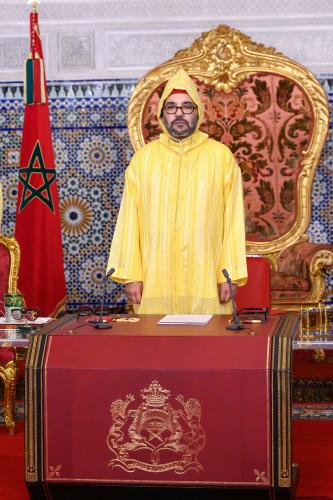
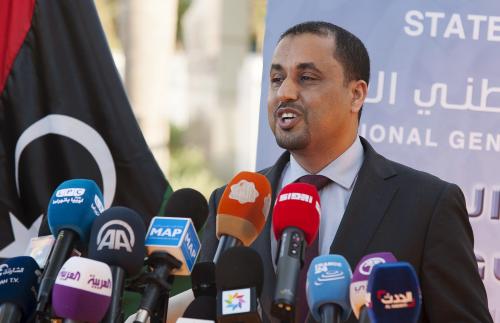
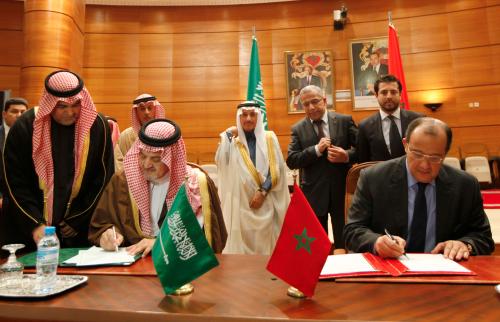

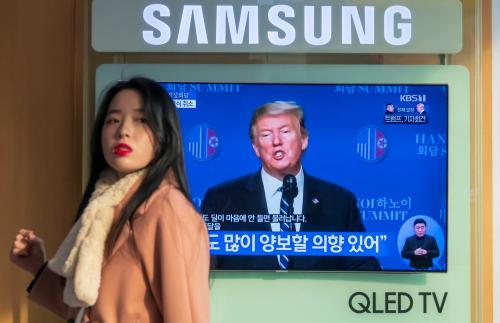
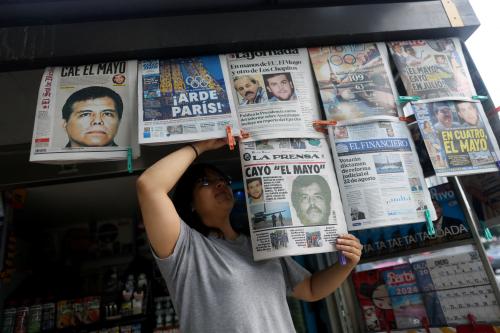
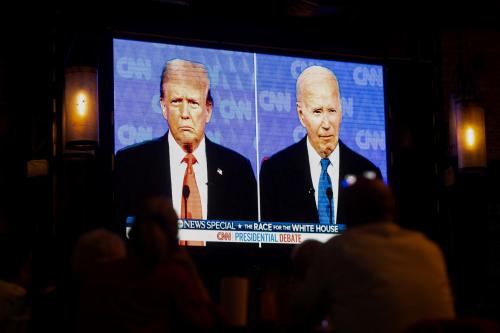
Commentary
Israel, Africa, and Libya: Morocco’s foreign policy trump cards
July 27, 2021